Dagstuhl-Seminar 25121
Scheduling
( 16. Mar – 21. Mar, 2025 )
Permalink
Organisatoren
- Claire Mathieu (CNRS - Paris, FR)
- Nicole Megow (Universität Bremen, DE)
- Benjamin J. Moseley (Carnegie Mellon University - Pittsburgh, US)
- Frits C. R. Spieksma (TU Eindhoven, NL)
Kontakt
- Andreas Dolzmann (für wissenschaftliche Fragen)
- Christina Schwarz (für administrative Fragen)
Gemeinsame Dokumente
- Dagstuhl Materials Page (Use personal credentials as created in DOOR to log in)
Programm
This Dagstuhl Seminar was number 8 in a series of Dagstuhl “Scheduling” seminars (since 2008). Scheduling is a major research field that is studied from a practical and theoretical perspective in computer science, mathematical optimization, and operations research. Applications range from traditional production scheduling and project planning to the newly arising resource management tasks in the advent of internet technology and shared resources. While there has been remarkable progress on algorithmic theory for fundamental scheduling problems, leading to insights for other fields as well, scheduling has proven to be an inspirational ground for new questions.
At this meeting, we have focussed on emerging models for fairness in scheduling and resource allocation. Traditionally, scheduling theory has focused on how to allocate resources to optimize quality of service guarantees, throughput, or efficiency. However, these objectives do not consider fairness to the underlying agents or entities.
An example of fairness considerations in government resource allocation can be observed in the distribution of healthcare resources, especially during times of crises like pandemic. A government may have a limited amount of resources available to distribute. One could distribute these to the areas affected most by the outbreak. It may also be important though to consider trade-offs between areas that traditionally have had disparities and are underfunded, ensuring vulnerable populations are not neglected. A government must balance immediate needs with long-term equability. Other examples of fairness in resource allocation and scheduling naturally arise in kidney exchange, school choice, tournament design, as well as political districting. These exciting and socially important problems demand to be better understood.
This seminar focused on three complementary themes.
- Fair Allocation. Fair allocation has taken center stage in multi-agent systems and economics over the past decade due to its significance both industrially and socially. Essentially, it addresses how to distribute items, whether they be goods or tasks, to agents in a way that leaves each content with their share. Notably, when dealing with indivisible items, perfect fairness metrics like envy-freeness and proportionality aren’t always achievable. Recent research endeavors focus on creating algorithms that approximate these fairness standards. On the other hand, game theory delves into the challenge of fairly dividing resources among individuals with entitlements, a dilemma found in numerous real-world scenarios, from inheritance divisions to electronic frequency allocations. Fundamental to fair division is the belief that the involved parties, perhaps with the aid of a mediator, should carry out the allocation, as they best understand their value assessments. A classic example of a fair division method is the “divide and choose” algorithm, which ensures that two participants each feel they have received the most favorable portion. The vast landscape of fair division research extends this principle to more intricate contexts, adapting to varying goods, fairness criteria, player characteristics, and other evaluation standards. Fair allocation, resource allocation and scheduling are fields that build on one another as often algorithmic and analysis techniques in one find uses in the others.
- Balancing Fairness and Quality of Service. In the algorithms community, striking a balance between fairness and quality of service (QoS) is a pressing concern. While algorithms, particularly in sectors like finance, healthcare, and social networking, play a pivotal role in decision-making, ensuring equitable outcomes without compromising efficiency or performance is challenging. Fairness ensures that no group or individual is unfairly disadvantaged or discriminated against by algorithmic decisions, and it aims to create an even playing field across diverse sets of users or stakeholders. On the other hand, quality of service emphasizes responsiveness, reliability, and overall user satisfaction. Balancing these two elements is challenging analytically. The area requires a deep understanding of how to model the trade-offs and algorithmically balance quality of service and fairness.
- Modeling Fairness. Modeling fairness in scheduling and resource allocation presents a plethora of challenges. Scheduling and allocating resources inherently involves making decisions that prioritize certain tasks, individuals, or groups over others, which can inadvertently introduce biases or create disparities. One fundamental challenge lies in defining what “fairness” actually means in varied contexts, as it can be subjective and differ across stakeholders. Even when fairness is well-defined, achieving it can sometimes conflict with optimizing for efficiency or maximum resource utilization. Additionally, when dealing with diverse sets of resources and stakeholders with distinct needs and preferences, ensuring equitable distribution becomes complex. There is also the issue of unseen biases in historical data, which, when used to train algorithms, can perpetuate past inequities. Furthermore, there is a constant need to balance immediate and long-term fairness, especially when resource availability fluctuates. Navigating these intricacies requires a deep understanding of real-world challenges to develop sound models for scheduling and resource allocation problems.
Organization of the Seminar. The seminar brought together 42 researchers from theoretical computer science, mathematical optimization, and operations research. The participants consisted of both senior and junior researchers, including a number of postdocs and advanced PhD students. During the five days of the seminar, 29 talks of different lengths took place. Five keynote speakers gave an overview of the state-of-the art of the respective area or presented recent highlight results in 60 minutes:
- Adrian Vetta: Six Candidates Suffice to Win a Voter Majority
- Swati Gupta: Fair Resource Allocation from Theory to Practice
- Kavitha Telikepalli: Fair solutions to the house allocation problem
- Ulrike Schmidt-Kraepelin: Proportional Representation in Budget Allocation.
The remaining slots were filled with shorter talks of 30 minutes on various topics related to the intersection of fairness, social choice, and scheduling.
Outcome. Organizers and participants regard the seminar as a great success. The seminar achieved the goal to bring together the related communities, share the state-of-the art research and discuss the current major challenges. The talks were excellent and stimulating; participants actively met in working groups in the afternoon and evenings. It was remarked positively that a significant number of younger researchers (postdocs and PhD students) participated and integrated well.
Acknowledgements. The organizers wish to express their gratitude towards the Scientific Directorate and the administration of the Dagstuhl Center for their great support for this seminar.
 Claire Mathieu, Nicole Megow, Benjamin J. Moseley, and Frits C. R. Spieksma
Claire Mathieu, Nicole Megow, Benjamin J. Moseley, and Frits C. R. Spieksma
At this Dagstuhl Seminar, we propose to focus on the established and emerging models for fairness in scheduling and resource allocation. The seminar will bring algorithmic scheduling researchers who traditionally consider scheduling and resource allocation to algorithmically optimize efficiency, without fairness considerations, together with researchers who model fairness and consider fairness allocation.
The seminar will focus on four complementary themes in fairness and resource allocation. The seminar will bring together researchers working on distinct areas to encourage cross-fertilization among different research directions. Moreover, these themes have sufficient overlap between them that it will be natural for participants to find common research directions.
Fair Allocation: Fair allocation has taken center stage in multi-agent systems and economics over the past decade due to its significance both industrially and socially. Essentially, it addresses how to distribute items, whether they be goods or tasks, to agents in a way that leaves each content with their share.
Balancing Fairness and Quality of Service: In the algorithms community, striking a balance between fairness and quality of service (QoS) is a pressing concern. While algorithms, particularly in sectors like finance, healthcare, and social networking, play a pivotal role in decision-making, ensuring equitable outcomes without compromising efficiency or performance is challenging. Fairness ensures that no group or individual is unfairly disadvantaged or discriminated against by algorithmic decisions, and it aims to create an even playing field across diverse sets of users or stakeholders.
Modeling Fairness: Modeling fairness in scheduling and resource allocation presents a plethora of challenges. Scheduling and allocating resources inherently involves making decisions that prioritize certain tasks, individuals, or groups over others, which can inadvertently introduce biases or create disparities. One fundamental challenge lies in defining what “fairness” actually means in varied contexts, as it can be subjective and differ across stakeholders.
Fairness in Tournament Design: Another theme where fairness and scheduling come together is in the design of tournaments. Tournaments are universally used mechanisms to rank alternatives; applications range from making hiring decisions to identifying winners in sport contests. Increased societal attention for fairness in these applications has brought about increased scrutiny over the existing rules that govern such tournaments. It has become clear that even in “simple” (and popular) formats such as a round robin, or a knockout tournament, fairness is a multi-faceted issue. Scheduling procedures used in these tournaments have a direct influence on the aspects determining fairness.
 Claire Mathieu, Nicole Megow, Benjamin J. Moseley, and Frits C. R. Spieksma
Claire Mathieu, Nicole Megow, Benjamin J. Moseley, and Frits C. R. Spieksma
Please log in to DOOR to see more details.
- Antonios Antoniadis (University of Twente, NL) [dblp]
- Yossi Azar (Tel Aviv University, IL) [dblp]
- Eric Balkanski (Columbia University - New York, US) [dblp]
- Etienne Bamas (ETH Zürich, CH) [dblp]
- Sanjoy Baruah (Washington University - St. Louis, US) [dblp]
- Emily Diana (TTIC - Chicago, US) [dblp]
- Franziska Eberle (TU Berlin, DE) [dblp]
- Yuri Faenza (Columbia University - New York, US) [dblp]
- Naveen Garg (Indian Institute of Technology - New Delhi, IN) [dblp]
- Swati Gupta (MIT - Cambridge, US) [dblp]
- Sungjin Im (University of California - Santa Cruz, US) [dblp]
- Thomas Kesselheim (Universität Bonn, DE) [dblp]
- Samir Khuller (Northwestern University - Evanston, US) [dblp]
- Alexandra Lassota (TU Eindhoven, NL) [dblp]
- Alexander Lindermayr (Universität Bremen, DE) [dblp]
- Alberto Marchetti-Spaccamela (Sapienza University of Rome, IT) [dblp]
- Claire Mathieu (CNRS - Paris, FR) [dblp]
- Nicole Megow (Universität Bremen, DE) [dblp]
- Benjamin J. Moseley (Carnegie Mellon University - Pittsburgh, US) [dblp]
- Viswanath Nagarajan (University of Michigan - Ann Arbor, US) [dblp]
- Seffi Naor (Technion - Haifa, IL) [dblp]
- Heather Newman (Carnegie Mellon University - Pittsburgh, US) [dblp]
- Debmalya Panigrahi (Duke University - Durham, US) [dblp]
- Kirk Pruhs (University of Pittsburgh, US) [dblp]
- Lars Rohwedder (Maastricht University, NL) [dblp]
- Thomas Rothvoss (University of Washington - Seattle, US) [dblp]
- Kevin Schewior (Universität Köln, DE) [dblp]
- Ulrike Schmidt-Kraepelin (TU Eindhoven, NL) [dblp]
- Jiri Sgall (Charles University - Prague, CZ) [dblp]
- David Shmoys (Cornell University - Ithaca, US) [dblp]
- Martin Skutella (TU Berlin, DE) [dblp]
- Frits C. R. Spieksma (TU Eindhoven, NL) [dblp]
- Clifford Stein (Columbia University - New York, US) [dblp]
- Leen Stougie (CWI - Amsterdam, NL) [dblp]
- Ola Svensson (EPFL - Lausanne, CH) [dblp]
- Kavitha Telikepalli (TIFR Mumbai, IN) [dblp]
- Marc Uetz (University of Twente - Enschede, NL) [dblp]
- Adrian Vetta (McGill University - Montreal, CA) [dblp]
- Tjark Vredeveld (Maastricht Univ. School of Business & Economics, NL) [dblp]
- Andreas Wiese (TU München, DE) [dblp]
- Hang Zhou (Ecole Polytechnique - Palaiseau, FR) [dblp]
- Rudy Zhou (Carnegie Mellon University - Pittsburgh, US) [dblp]
Verwandte Seminare
- Dagstuhl-Seminar 08071: Scheduling (2008-02-10 - 2008-02-15) (Details)
- Dagstuhl-Seminar 10071: Scheduling (2010-02-14 - 2010-02-19) (Details)
- Dagstuhl-Seminar 13111: Scheduling (2013-03-10 - 2013-03-15) (Details)
- Dagstuhl-Seminar 16081: Scheduling (2016-02-21 - 2016-02-26) (Details)
- Dagstuhl-Seminar 18101: Scheduling (2018-03-04 - 2018-03-09) (Details)
- Dagstuhl-Seminar 20081: Scheduling (2020-02-16 - 2020-02-21) (Details)
- Dagstuhl-Seminar 23061: Scheduling (2023-02-05 - 2023-02-10) (Details)
Klassifikation
- Data Structures and Algorithms
Schlagworte
- scheduling
- fairness
- mathematical optimization
- algorithms and complexity
- uncertainty

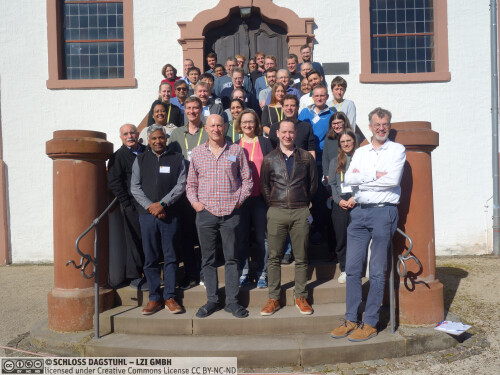
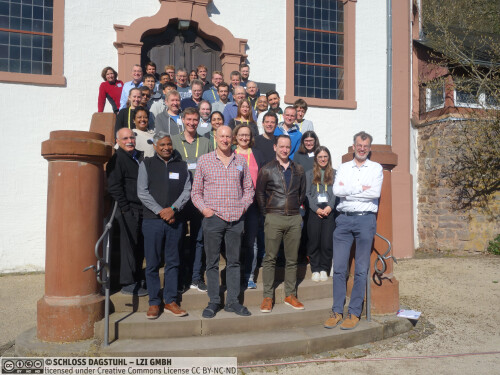
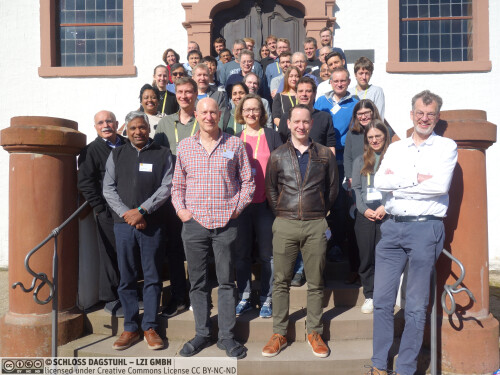
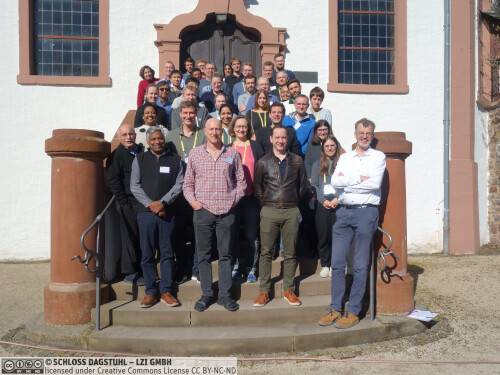
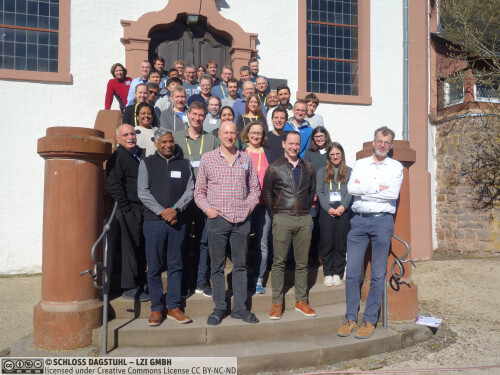
 Creative Commons BY 4.0
Creative Commons BY 4.0
